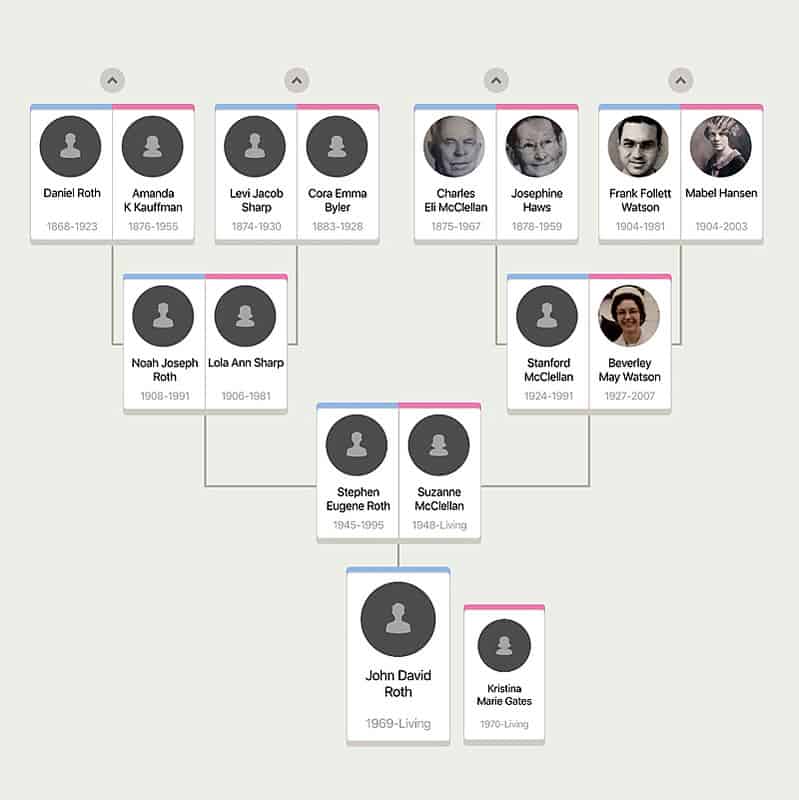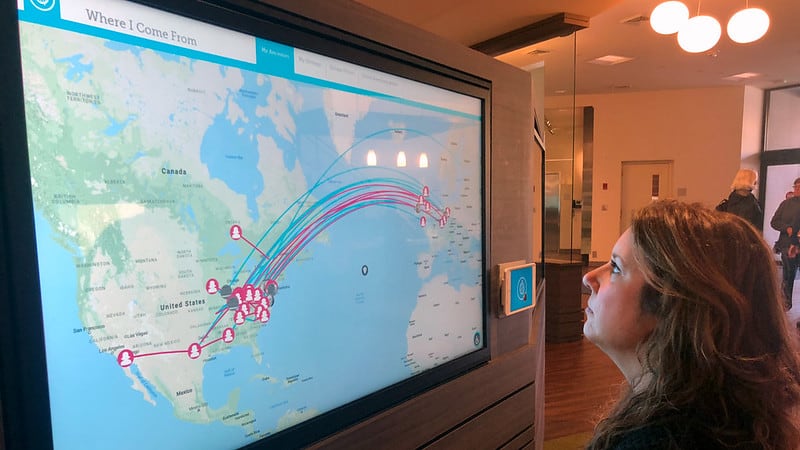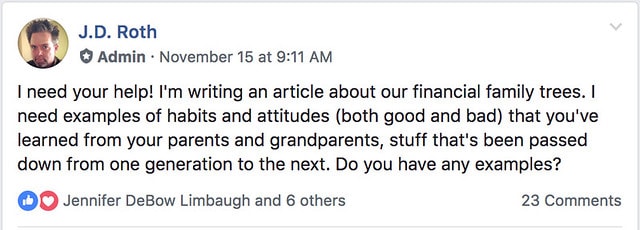Your financial family tree: What our parents teach us about money

Last weekend, Kim and I flew to Utah for a reunion with friends from the 2016 chautauqua in Ecuador. While in Salt Lake City, we met up with Jesse Mecham (the founder of You Need a Budget), visited Utah Olympic Park, and attended a Sunday morning performance of the Mormon Tabernacle Choir.
Our group also spent an entire afternoon at the Mormon Family History Library, where we explored our genealogy. Not everyone was enthused about researching their family tree at first, but eventually even those who thought the exercise would be lame found themselves wrapped in it. It's fun — and enlightening — to unravel the threads of time and discover who your ancestors were and where they came from.
Flying home from Salt Lake City, I got to thinking about how our family trees don't just influence our genetics. We inherit more than physical features from those who came before us. We also inherit culture and psychology and values. And yes, we inherit financial habits from our parents and grandparents.
Each of us has a financial family tree.
My Financial Family Tree
I write often about our money blueprints, the set of subconscious “scripts” that define our behaviors and attitudes toward money. Society at large — our friends, co-workers, the mass media — plays a role in writing these scripts, but most of our money blueprints are inherited from our family — especially our parents.
In a way, it's as if our money blueprints are a product of our financial family trees. Our grandparents passed their feelings about money to their children, and these children instilled their habits and attitudes into us.
When I look at my own relationship with money, it's easy to see how my present actions and attitudes — even at nearly fifty years old! — were inherited from my parents.
Here are a few examples:
- My parents raised three boys in an 800-square-foot trailer house. My parents had 800 square feet for the entire family. The Portland condo that Kim and I sold last year was 1600 square feet. She and I had 800 square feet per person. But I don't need a big, fancy house. I'd be happy — might be happier, in fact — hunkered down in a single-wide trailer somewhere on a couple of acres.
- Likewise, I don't need fancy cars. Growing up, I don't think my parents ever had a new car. We had old beaters that went by names like “Dirty Red” and “Dirty White”. Now, as an adult, I'm perfectly content to drive a 15-year-old Mini Cooper. I rarely feel the urge to own a new vehicle.
- I inherited a similar attitude toward clothing. My father dressed like a farmer. My mother did her best to look nice, but on a budget. She bought clothes for us boys off close-out racks and at thrift stores. Although I do put some thought into quality and style nowadays, for most of my life I've been more interested in function not fashion.
Because of my meager origins, I'm willing to tolerate and accept certain things that others won't. I'm never frightened that I might end up poor because I've already been poor and have survived the experience. In some ways, my financial family tree set me up for success.
That said, my financial family tree also set me up for failure. I inherited some destructive habits.
- My father was a master of compulsive spending — especially on big-ticket items that he couldn't truly afford. He bought computers. He bought sailboats. He bought airplanes. He bought stereo equipment. Some of my fondest memories are hanging out with dad for hours while he shopped for something he shouldn't buy. Unsurprisingly, I've struggled with compulsive spending most of my adult life.
- My mother wasn't a compulsive spender in the same way my father was. Instead, she was something of a hoarder. She tended to buy more than we actually needed: more food, more clothes, more household supplies. This tendency became especially pronounced after dad died. When we moved mom to assisted living in 2011, her house house was packed with excess groceries and supplies. From mom, I've inherited a tendency to accumulate too much Stuff.
- My parents never saved. They were always living on their last five dollars. If they had money, they spend it. If they'd had credit cards, they would have maxed them out. When I left home, I too lived paycheck to paycheck, no matter how good my salary was. (And I did get into trouble with credit cards.)
Not all of my money habits came from my parents. Many did, it's true, but I've developed new habits of my own. I've also “inherited” habits from my long-term relationships with Kris and Kim. (Kris and Kim have remarkably similar money habits, by the way.)

Your Financial Family Tree
When I returned from Utah, I emailed family members to ask them what sorts of habits they'd inherited from their parents. My cousin Duane replied:
My dad had a huge impact on my relationship with money. He drilled holes through nickels rather than pay six cents for stainless steel washers. This was extreme and he did it more to be funny, but really illustrates how cheap he was. He strongly influenced my views of money. That's why I'm a cheap bastard.
My dad didn't feel he deserved money. Perhaps because he didn't like it. I have also felt I don't deserve money. I always give things away or sell them too cheaply.
I also asked members of the Get Rich Slowly group on Facebook about their financial family trees.
The answers — both in the group and via private message — were fascinating. For instance, Angela wrote:
Both of my parents worked as bankers when they were younger, so they talked openly about money when I was growing up and checked in with each other regularly regarding finances. I didn't realize how unusual that was until I was married and that was not the case with my husband and his family.
My dad was also self-employed, so they had to pay for many things out of pocket, like doctor's visits and dental. So my dad would barter for services. I grew up knowing that bartering is a possibility…
I really value the transparent attitude regarding money that they passed down to me.
Luke, too, learned the value of talking about money openly — but as a reaction to what his parents did not do:
My parents never talked openly about money, their situation, their goals. They both tried their hand at managing the house and both succeeded and failed in different ways, but it lead to a lot of fighting because they were never on the same page.
My wife and I are completely open and honest about how we spend, what are goals are, and how we will get there together. If I die tomorrow, she will know how to manage our money when I’m gone.
Rebecca's parents weren't transparent about money when she was younger. Now, though, they regret that.
I was raised that talking about money was in very poor taste. You never asked what people made, etc. That came from my dad's side of the family.
My mom didn't have much growing up and was very frugal (washing and reusing all the plastic wrap kind of thing). But my mom loves to “splurge” on things, so money was used to treat yourself, a definite reward system. I definitely fall into that trap, an engrained emotional response to treat myself.
My dad now says his biggest parenting mistake was to not to talk to us and educate us about money, saving and investing.
Some people come from families that had money and knew how to handle it. For example, Stephen's grandparents retired early back before the FIRE movement was a even a thing:
I only recently put two and two together and realized that my grandparents on my dad's side saved aggressively – invested the savings – and retired early – the early version of FIRE…
They influenced me greatly with their wisdom. I was advised by my grandmother that when it came to my diet, I should consider everything in moderation including moderation. My grandfather advised me to never carry debt, and if I had any to pay it off as soon as possible which I tried to follow, and my grandfather would often have BBC current affair programs on which I would watch with him.
But you don't have to be raised with money to learn good habits. Laronda's parents were poor but still set a good example.
My mom grew up dirt-poor as the twelfth of thirteen children in Appalachia. I learned to be resourceful from her. She can up-cycle, mend, and re-purpose with the best of them. She's a wonderful from-scratch cook and is able to turn inexpensive ingredients into tasty dinners. (I'm feeding my own family her stewed beans and cornbread this evening.)
My dad grew up slightly better off but I don't get the impression his family discussed finances much. He taught my brothers and I how to do basic home and auto repairs and gave me an outfitted tool box when I left home.
Growing up, we never discussed money or how to manage it. My brothers and I knew money was a tense, to-be-generally-avoided topic, and we knew not to ask for things.
I've graduated to the middle class and use many of my parents' frugal methods like scratch-cooking, mending and DIY home repairs, but I consciously choose to talk about money frequently with my own spouse and with my three children. I'm hoping my kids are better equipped with money management knowledge and skills when they strike out on their own than I was, but I also hope they benefit from their grandparents' gifts of resourcefulness and general competence in the face of any household challenge.
Finally, here's a story from a reader named Frank:
Neither of my parents had any real financial literacy. My grandmother was my real parent, and she taught me everything I know about money.
As a child, she escaped a war-torn country. She got married. She and her husband had a farm, but he killed himself after all of their chickens died. My grandmother was left to raise two kids alone.
Somehow, she scraped together enough to buy a hotel. She sold it and built a bigger hotel. She sold that and split the money with with my mother. But mom spent it all because she didn't appreciate the work and investment that had gone into building the fortune. Meanwhile, my grandmother quadrupled her half of the wealth.
I'm terrified to be my parents. I've tried to learn from my grandmother. The best thing she taught me was to live well below my means. I'm doing that and busting my ass to make my money grow.
Other members of the Get Rich Slowly FB group pointed me to longer articles they've written about this subject. At Choose FI, Chad shared what his parents taught him about financial independence. Fritz Gilbert from Retirement Manifesto has written about 18 lessons he learned from his dad. And Frogdancer Jones' parents taught her to approach retirement from a position of strength.
Finally, Tom Drake from Maple Money (my new collaborator here at GRS) told me: “My parents were always spenders, which led me to be a spender. However, seeing how that affected them in retirement has helped me realize the importance of reducing my spending to be able to save for the future.”
Final Thoughts
Although I can't recall having read any academic studies on the subject, I'm convinced that we do inherit money blueprints from our financial family tree. Your basic money habits are a product of what you learned from your parents and grandparents.
In some cases, these blueprints are a reaction against how your family behaved. Most of the time, however, you mimic what you saw when you were young.
The good news is that you're not doomed follow in your family's footsteps. Although these money scripts are deeply-ingrained and will always linger in the back of your mind, you have the knowledge and ability to create better habits, to draw a new, improved money blueprint.
From experience, I can tell you that the transformation takes time. It won't happen overnight. But with enough patience and effort, you can change your frame of mind. You can become a money boss and produce a new branch on your financial family tree.
Related reading: If, like me, you're fascinated by the idea of money blueprints and financial family trees, you might like this article on writing your financial autobiography.
Become A Money Boss And Join 15,000 Others
Subscribe to the GRS Insider (FREE) and we’ll give you a copy of the Money Boss Manifesto (also FREE)



